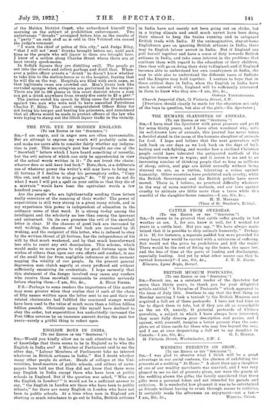ENGLISH BOYS IN INDIA.
[To THE EDITOR OP THE " SPECTATOR."] SIR,—Would you kindly allow me to call attention to the lack of knowledge that there seems to be in England as to who the English in India are? A Member of Parliament said to me the other day, "Labour Members of Parliament take no interest whatever in British artisans in India." But I doubt whether many other people do either. Heads of colleges at the Uni- versities, head-masters of public schools, and editors of news- papers have told me that they did not know that there were any English in India except those who have been at public schools in England. But if the question was asked, " Who are the English in London? " it would not be a sufficient answer to say, " the English in London are those who have been to public schools," for there are many English in London who have not been to public schools. At a time when men in England are showing so much reluctance to go out to India, British artisans
in India have not merely not been going out on strike, but in a trying climate and amid much unrest have been doing their utmost to keep the trains running and to safeguard British trade with India. If the unimaginative, stay-at-home Englishman goes on ignoring British artisans in India, there may be English labour unrest in India. But if England can pull herself together and have a sense of duty towards British artisans in India, and take some interest in the problems that confront them with regard to the education of their children, then they will go on doing their duty to England, and if England becomes able to understand her own countrymen in India, she may be able also to understand the different races of Indians and the Empire may hold together. I venture to hope that in these critical days in India, when the English in India have much to contend with, England will te sufficiently interested in them to know who they are.—I am, Sir, &c., OSWALD YOUNGIIIISBAND. Church Imperial Club, 75 Victoria Street, S.IV.
[Provision should clearly be made for the education not only of the boys in question, but also of the girls.—En. Spectator.]


































 Previous page
Previous page